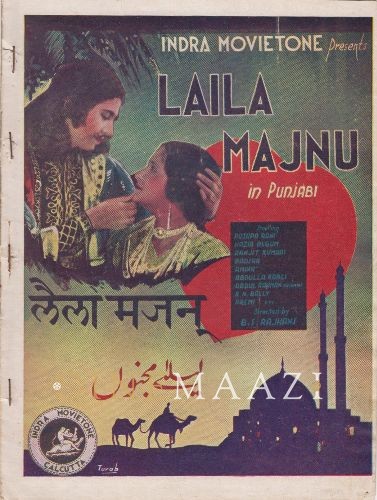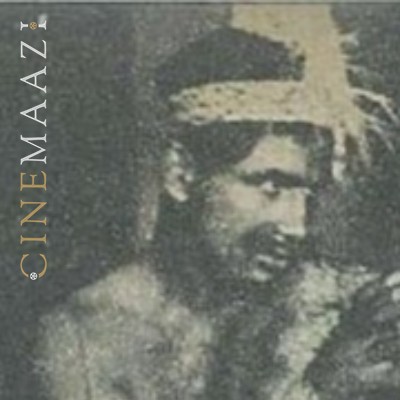Bekal Amritsari
Subscribe to read full article
This section is for paid subscribers only. Our subscription is only $37/- for one full year.
You get unlimited access to all paid section and features on the website with this subscription.
Not ready for a full subscription?
You can access this article for $2 , and have it saved to your account for one year.
- Real Name: Baldev Chander Arora
- Born: 16 April, 1917 (Amritsar)
- Died: 16 April, 1982
- Primary Cinema: Punjabi
- Spouse: Bimla Arora
Poet, film director, screenplay writer, and lyric-writer for songs in the 50s and 60s for both film and non-film music, Bekal Amritsari is known for films such as the cult classic Nanak Naam Jahaz Hai (1969), Miss Coca Cola (1955), Hazaar Pariyan (1959), Do Behnen (1959), and Kiklee (1964).
Born in Amritsar on 16 April, 1917 he took on the pen name Bekal which means restless, when he first started writing. Writing was in his blood, being the nephew of legendary Punjabi poet, Dhani Ram Chatrik. His younger brother, J D Mastana was also a writer, famous for his play Preeto. In the preface to his book Bekal de Geet, Bekal himself wrote, “Writing songs everyday comes as naturally to me as talking to my baby daughter, Poli.”
Bekal had been jailed at 19 by the British for his fiery, nationalistic poetry. Surrounded by fellow prisoners in his prison cell in Lahore, they would gather around to hear his words flow. Appreciated as a born performer, his admirers gave him the unofficial title ‘Stage da Maalik’ or the one who owned the stage. He was an exceptional performer and though he never pursued a career in singing, he was a talented vocalist. Bekal Amritsari went on to acquire the title of Gyani—the equivalent of a PhD in Punjabi language and literature, and was fluent in Punjabi, Urdu and Hindi.
His film career started in 1940 in Lahore, writing for Punjabi films Laila Majnu (1940), and Mera Punjab (1940), for which he penned every song. He had struggled to get into the film industry till the opportunity fell into his lap when he received a telegram from the East India Film Company, inviting him to Calcutta to work on the music of several films. He spent the next couple of years shuttling between Calcutta, Amritsar and Lahore, working on songs for films such as Mera Maahi (1941), Gowandhi (1942), and Jawab (1942). In Calcutta, he became acquainted with the famous actor-singer K L Saigal. A close friendship developed between them, and Saigal, impressed by Bekal’s writing, assigned him the writing of his Punjabi songs. The resultant two songs—Woh sahne sakiya meri and Mahi naal je—were the only songs that Saigal ever sang in Punjabi. Saigal had, in fact, even sang the word Bekal in the song Mahi naal je, to show his affection for Bekal.
Bekal’s career continued to grow, and he went on to write screenplays as well as co-direct films. Moving to Bombay in the 40s, he worked on several films such as Miss Coca Cola (1955), Hazaar Pariyan (1959), Do Behnen (1959), and Kiklee (1964). In the course of his career, Bekal worked with popular names such as Shammi Kapoor, Mohammed Rafi, Shamshad Begum, Geeta Dutt, Geeta Bali, Prem Chopra, Nargis, Tun Tun, Madan Puri, and Sulakshana Pandit.
The film Chaudhry Karnail Singh (1962), for which Bekal Amritsari wrote the screenplay as well as 8 songs, became the first Punjabi film to receive a certificate of merit from the jury of the National Film Awards.
Lady Robinhood (1959) was the last Hindi film that Bekal wrote lyrics for, following which he began to work on his pet project, the well-known cult classic Nanak Naam Jahaz Hai (1969). Very early in his writing journey, Bekal had shared that his pen was meant to serve Punjabi, and the Sikh religion. His film Nanak Naam Jahaz Hai was testament to this. It released on the 500th birth anniversary of Guru Nanak. It was Bekal Amritsari’s masterpiece, and from the idea of the film to its screenplay and direction, he was deeply involved in the film and its creation. He also became the first and only person to receive permission to shoot inside the Golden Temple, after spending a considerable amount of time explaining the plot and aim of the film. The film also featured appearances by the 14th Dalai Lama, as well as Khan Abdul Ghaffar Khan who was famously known as Frontier Gandhi. The message of the film was not just religious but moral; focussing on virtues like love, honesty and forgiveness, woven into an interesting storyline. Starring Prithviraj Kapoor and Suresh, the film was an instant hit and ran houseful for weeks. Such was its impact that people would take off their shoes and cover their heads before entering the cinema hall. Nanak Naam Jahaz Hai became the first Punjabi film ever to be honoured with the National Film Award. It also received the Filmfare Award for Best Story and Dialogue.
After this film, Bekal Amritsari retired from films, devoting all his time to his family, writing and other hobbies such as gardening and palmistry. Bekal Amritsari passed away on his 65th birthday, on 16 April, 1982.
References
Information courtesy:
https://www.cinemaazi.com/feature/remembering-my-great-grandfather-bekal-amritsari
-
Filmography (1)
SortRole
-

Laila Majnu 1940
-









.jpg)



